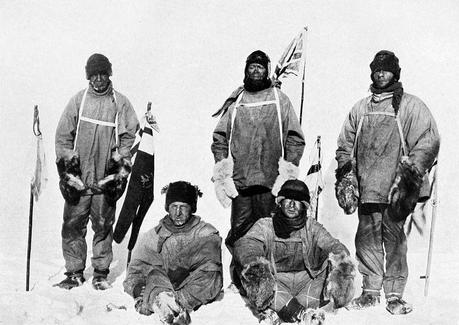 Over the past few months I've written several times about certain milestones in Antarctic history. After all, it has been 100 years since Norwegian Roald Amundsen and his British rival Robert Falcon Scott raced one another across Antarctica to be the first person to reach the South Pole. Today marks yet another milestone in that race and sadly this is one of those dates that still haunts us a century later.
Over the past few months I've written several times about certain milestones in Antarctic history. After all, it has been 100 years since Norwegian Roald Amundsen and his British rival Robert Falcon Scott raced one another across Antarctica to be the first person to reach the South Pole. Today marks yet another milestone in that race and sadly this is one of those dates that still haunts us a century later.As I mentioned last week, Scott and his two remaining companions, Edward Wilson and Henry Bowers, were caught in a vicious snowstorm that lasted for at least nine days. Over that period they slowly ran out of food and fuel. With nothing to eat and unable to keep themselves warm, their last remaining strength fled their tired bodies. At that point they had been marching through the Antarctic for more than four and a half months and they were throughly exhausted in mind, body and spirit. The physical toll on that journey was heavy one, but arriving at the Pole to find that they had been beaten by Amundsen was truly the worst blow imaginable.
So, Scott, Wilson and Bowers found themselves in that tent, hoping beyond hope that the weather would clear long enough for them to cover the eleven remaining miles to their "One-Ton Depot." A supply cache that would give them everything they would need to complete their journey back to their ship, the Terra Nova, which waited off the coast for their return. Considering the distances they had already covered on the Antarctic continent, eleven more miles hardly seemed like much at all. It might as well have been eleven light years however, because they were unable to travel anywhere in that storm.
It was on this date, exactly 100 years ago today, that Scott made his final entry into the journal that he had been so diligently keeping for all those weeks. That final entry simply said: "Last entry. For God's sake look after our people." Those words tell us that Scott knew that they were done for and that he would never see Britain or his family again. Historians say that when their tent was discovered some eight months later, that it was believed by the positions of their bodies that Scott was the last of the expedition to die.
Those weren't the last words we heard from Scott however as he also wrote a number of letters to those closest to him. They were discovered on his body and while we don't know the contents of all of them, he did write a "Message to the Public" that was in many ways an explanation of why he felt compelled to explore the Antarctic for King and Country. That letter concluded with the following statement:
"We took risks, we knew we took them; things have come out against us, and therefore we have no cause for complaint, but bow to the will of Providence, determined still to do our best to the last ... Had we lived, I should have had a tale to tell of the hardihood, endurance, and courage of my companions which would have stirred the heart of every Englishman. These rough notes and our dead bodies must tell the tale, but surely, surely, a great rich country like ours will see that those who are dependent on us are properly provided for."Those words showed his indomitable spirit and stiff English-upper lip that were his trademark to the very end. They were also the words that would make him a hero back home in the U.K. where he is revered to this day. Scott is a symbol of that country's great legacy of exploration and while he may have failed in his mission, he remained a true Englishman even in the face of his inevitable end.
For me personally, Robert Falcon Scott remains one of history's most tragic characters, yet someone who is incredibly inspirational as well. He had a spirit for adventure and exploration that I think is no less important in this day and age as it was 100 years ago. His story is one that we should never forget and think about when we are looking for excuses to stop our own adventures. After all, I can think of worse things to ask than "What Would Scott Do?"

